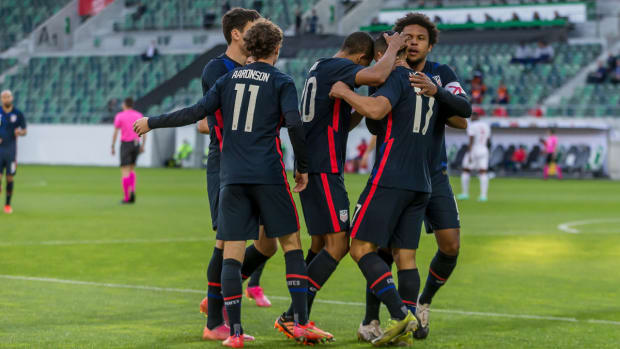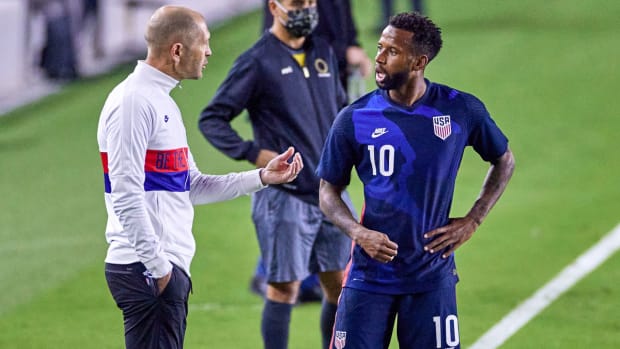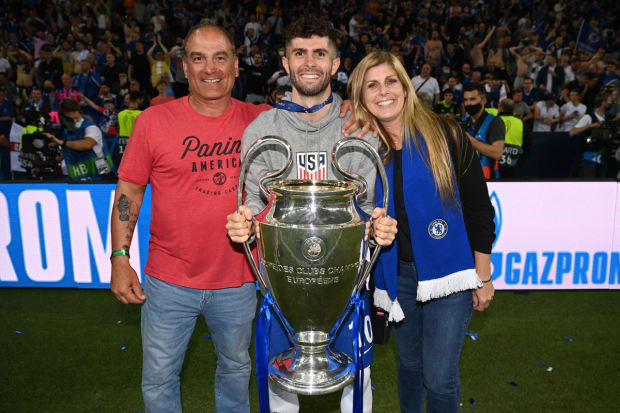For this young U.S. men's national team, learning to win together after individual successes at the club level is the next step.
A trophy has been unveiled. The winner of Concacaf’s new competition, the Nations League, will receive a 20.5-inch high, slender, silver-plated cup featuring four spiraling wings that represent this week's semifinalists. It all rests on a base of raw, unpolished stone that’s a fitting symbol for the region’s bedrock countries, which this tournament is supposed to benefit.
The inaugural Nations League's final four have gathered in Denver, where on Thursday evening the USA will meet Honduras before Mexico faces Costa Rica. On Sunday, the winners will play for that trophy. It’s a decent piece of hardware, and it’ll look good on a shelf. But what does it really stand for, exactly? What honor will the victor have claimed?
The Nations League isn’t the regional championship. That’s the Gold Cup, which will be contested for the 16th time in July-August. The Nations League isn’t the championship of anything, in fact. It’s a tournament designed to fill dates, to give Concacaf teams something to do. The smaller national sides weren’t playing nearly enough. Soccer was stagnant in too many parts of Concacaf. And there was concern that teams like the USA and Mexico were going to find it tougher to schedule friendlies thanks to UEFA’s Nations League and a more congested global calendar. So here we are, with a secondary competition that’s kind of superfluous, kind of redundant and lacking in tradition, clarity and context.
But it is a nice trophy. So while history takes its time to determine whether or not a Nations League title means anything to anybody, coach Gregg Berhalter and his young, unproven and talented U.S. national team will focus on the silverware itself. Berhalter has been building his program carefully over the past couple of years, establishing chemistry, standards, culture and style. Despite the pandemic, a foundation has been established. There’s an approach. There’s an identity.
The time for building is coming to an end, however. The current U.S. camp, which started with Sunday’s friendly loss to Switzerland and will end with a June 9 exhibition against Costa Rica, represents the last time Berhalter’s first-choice players will be together before World Cup qualifying begins in September. Those qualifiers mean everything to a program that failed so spectacularly nearly four years ago. And so the last piece of Berhalter’s puzzle now must be put into place. It’s been about process. Now it’s about results.

“It’s definitely been a pivot,” Berhalter said as camp began. “Now is the time, right? Now is the time. When you go into a summer when you have two trophies, and then you have World Cup qualifying and then the World Cup, we’re talking about in a year and a half's time, one cycle is going to be done, basically. And this group is going to define itself based on how we do in this year and a half. … Now it’s about going out and showing it. I think we laid the groundwork and the guys are comfortable with who we are as a group, and now it’s about performing.”
Winning—especially under pressure or duress in a sport with fine margins—can be an art or skill unto itself. It can become a habit, as we see frequently in the teams or athletes who seem to rise to the occasion so consistently. Champions need to develop the sort of instincts, reflexes and muscle memory that make the difference in big moments, and that has to start somewhere. That somewhere may as well be Denver. For those reasons, this Nations League trophy matters, even if the title that comes with it doesn’t. A young U.S. team that’s ready to win will infuse this new tournament with meaning.
“I think it’s new to all of us,” U.S. forward Gio Reyna said of the Nations League. “I’m not exactly sure why or when it was formed to be honest, but whenever there’s an opportunity to grab a trophy on your continent and kind of feel victorious—obviously all the top teams from our region are in there—and any time we can kind of come out on top there it’s always going to be special. And obviously, I don’t think many of us have won international trophies before. So I’m sure, not only myself but the whole team, is really focused on winning that too. Obviously it’s a great opportunity for us.”
The national team’s most recent trophy was won at the 2017 Gold Cup. That honor was sullied almost immediately by the subsequent qualifying failure in Trinidad. Only two athletes who played a part in that Gold Cup, Kellyn Acosta and Matt Miazga, are on Berhalter’s 23-man Nations League squad. The U.S. player pool has turned over dramatically since then, and it’s even evolved since the Nations League group stage was contested back in the fall of 2019. This team’s potential has risen, and its members have made quick and historic progress.

Since the clear low point of Berhalter’s tenure, an ugly 2–0 Nations League loss to Canada in October 2019, he’s been able to introduce the likes of Reyna, Yunus Musah, Brenden Aaronson and Mark McKenzie to the team. During the same span, other players have matured and taken massive steps in their club careers. Christian Pulisic went to Chelsea, Weston McKennie went to Juventus, Sergiño Dest transferred to Barcelona and Zack Steffen spent his first season at Manchester City. Those four were among 10 national team members who claimed a combined 13 trophies during the '20–21 season, capped off by Pulisic’s triumph in last Saturday’s Champions League final.
Increasingly, American players are winners individually. From that, a collective expectation and mentality should take shape.
“You’re seeing where they’re playing at, and they’re winning big trophies and it’s huge—it’s a really big step in U.S. football,” said Aaronson, who won the Austrian league and cup double with RB Salzburg. “I’m really excited for the group of guys, and now it’s just pushing onto the Nations League and then winning a trophy with this group of guys. So that’s the biggest thing right now. It’s the main focus for everybody here.”
Berhalter said, “They’re in teams that are competing to win titles and that’s exciting because what it does, is it carries over a culture of winning to the U.S. national team. And that’s what we’re looking for.
“When we step on the field and we compete to win these trophies, we want guys that really understand what it means to win and value what it means to win, but also having the expectation that winning is what we’re looking for, and anything less than that isn’t good enough,” Berhalter continued. “And we have a group that can do it. It’s not going to be easy. It’s easy to talk about it. It’s a lot harder to do. It’s a lot of sacrifice. It’s a lot of hard work. It’s a lot of intensity. But we feel we have a strong group.”
Over the past few years, the USA has lost its grip on Concacaf, the 2017 Gold Cup crown notwithstanding. There was the failure to make the 2018 World Cup as the USA finished a miserable fifth out of six teams in the final round of qualifying. The Americans have beaten Mexico just once in the past six games between the rivals over the past six years and with a trophy on the line, they’re zero for the past four against El Tri. A third consecutive Olympic qualifying miss, confirmed in March, amplified the trend.
Several years of frustration won’t be erased in a week. But winning Thursday and Sunday would send a warning and whet the appetite. It would confirm the confidence this young group has in itself, and that’s a milestone for which these players are yearning. It’s not about the Nations League title. It’s about developing and then sustaining a championship mentality. That hunger is personified by Pulisic, who celebrated Chelsea’s Champions League triumph in a U.S. Soccer sweatshirt before flying to Denver. He’s had a long, trying season. But he’s not ready for a break just yet. That's because the momentum is real, and because the threshold on which his national team stands is too important and inviting.

“You try to tell Christian that he’s not playing on Thursday,” Berhalter said. “That’s going to be a very difficult one, coming off of winning the Champions League—coming in the [final], making an impact in that game—he’s ready to go. It would be very hard to keep him out of the lineup.”
Said McKennie, who just lifted the Coppa Italia with Juve last month, “Christian coming back and being fit, coming off the high of winning the Champions League, it’s very important to also be able to bring that mentality over here. … When someone wins a trophy it just helps the group realize that we want to have a winning mentality, that we want to win trophies.”
The USA and Honduras haven’t met in nearly four years, so the Americans’ six-game unbeaten run against Los Catrachos won’t mean much in Denver. Those matches were contested in a different era. A majority of the Honduran squad is based domestically. It's augmented by three MLS players and a half dozen Europeans, including Boavista forward Alberth Elis and Cádiz forward Anthony Lozano. Traditionally, Honduras is a robust, direct, counterattacking team, which could be overwhelmed by Berhalter’s high press or give it fits.
Los Catrachos have played only four games in the past 18 months, and the USA enters the semifinal as the favorite. But as we’ve seen so many times in Concacaf, when the games are competitive, when there’s something at stake, everything tends to tighten up. Adversity occurs. The unexpected happens. Those are the moments this young U.S. side must learn to master. The exam begins Thursday. That’s what this Nations League is about.
“Any time you get teams together to compete in a tournament format, it’s exciting. And with this being the first version of that, we want to win it and we want to compete to lift that first trophy,” Berhalter said. “It’s involving the top teams in our region, so that's a good thing. When you watch the European Nations League, it was great. The semifinals and final was a great event, and I think we’re helping—it’s a help to the smaller soccer nations that get to compete in these events. And then when you get to the semifinals and the final is when you get to see the big nations squaring off against each other. For us, it's a great competitive event.
“These guys are competitive and they want to win trophies,” Berhalter concluded. “And the best way to do that is to win on Thursday and then have a great game in the final and win that.”
More U.S. Soccer Coverage: